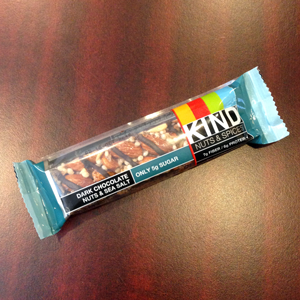 You’re at the checkout counter of your local grocery store, and you’re craving a snack. You’re about to grab a chocolate bar from the bookshelf-sized repository of candy in your checkout lane, but then you spot a Kind fruit-and-nut bar. You think to yourself that you really should choose the healthier option, so you ditch the chocolate and grab the Kind bar, which says “healthy” right on the label. You’ve almost certainly made the right choice.
You’re at the checkout counter of your local grocery store, and you’re craving a snack. You’re about to grab a chocolate bar from the bookshelf-sized repository of candy in your checkout lane, but then you spot a Kind fruit-and-nut bar. You think to yourself that you really should choose the healthier option, so you ditch the chocolate and grab the Kind bar, which says “healthy” right on the label. You’ve almost certainly made the right choice.
However, in a recent warning letter, FDA cites Kind, LLC for a number of misbranding violations tied to four varieties of its popular Kind bars. One of the “significant violations” that FDA cites is Kind’s misuse of the word “healthy.” Under federal regulations, the word “healthy” is an “implied nutrient content claim” that has a very specific meaning. According to FDA regulation, “healthy” means a food “low” in saturated fat (1 gram or less per Reference Amount Customarily Consumed (RACC) and 15% or less of calories from saturated fat), “low” in fat, at or below the “disclosure level” for cholesterol, containing 480 milligrams or less of sodium per RACC (or per 50 grams if the RACC is “small”), and containing at least 10% of the percent daily value per RACC for vitamins A, C, calcium, iron, protein, or fiber. Unfortunately for Kind, four of its bars exceeded the “healthy” level of saturated fat set forth in the regulations. Because the products are not “healthy,” as defined by FDA, calling them healthy makes the products misbranded under federal law.
Does the 2.5 grams to 5 grams of saturated fat in the four products make them not healthy, in the real-world sense of the word? Are the products bad for you because they don’t fit FDA’s definition of “healthy”? Probably not. Rather, the notion that all fats are per se unhealthy is outdated “knowledge” that has been preserved by FDA regulation. Experts are questioning the conventional wisdom that all (or even most) fats are unhealthy. Moreover, every five years, the government issues a new edition of the Dietary Guidelines for Americans with the goal of guiding the American public toward a healthier overall diet. According to the Scientific Report of the 2015 Dietary Guidelines Advisory Committee, which will inform the 2015 edition of the Guidelines, nuts (and their fats) are part of a healthy diet and carry a number of health benefits. The saturated fat in the Kind bars comes largely from the bars’ nut content. With their abundance of fruits and nuts, Kind bars are likely healthy based on a current understanding of nutrition. However, FDA’s regulations do not benefit from regular, periodic updates, so its definition of “healthy” doesn’t take this new understanding of fats into account. But even though FDA’s definition of “healthy” does not parallel current research—or the views of sister agencies in the federal government—Kind and other food and supplement companies must comply with its regulations.
Food and dietary supplement marketers alike must follow a host of complex regulations and laws to avoid legal action, such as a warning letter from FDA. Similar to the definition of “healthy,” the term “plus” has a specific meaning set out in FDA’s regulations. Kind was cited for misusing the “plus” word/symbol on its labeling. Additionally, by claiming that its products contained no trans fats (which was a true statement), Kind was then obligated to specify its products’ levels of monounsaturated and polyunsaturated fatty acids—which it failed to do.
Given the complexity of the unique area of food and dietary supplement law, food and supplement marketers need advice from informed legal counsel. Even firms the size of Kind can slip up without the right guidance. A company will be ill-served using its real estate or contract lawyer to review its product labels for regulatory compliance—a brief glance at FDA’s warning letter to Kind reveals the depth and breadth of legal knowledge required to properly advise a company. Call the lawyers at Collins, McDonald & Gann at 516-294-0300 with any questions you have about dietary supplement or food labeling, and to learn what you can do to best avoid receiving an FDA warning letter.
